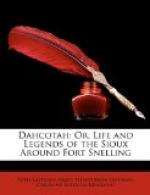The storm raged wilder and louder—the driving wind scattered the hail around him, and at length the chief raised the door of his teepee, and joined his frightened household. Trembling and crouching to the ground were the mothers and children, as the teepee shook from the force of the wind. The young children hid their faces close against their mothers’ breasts. Every head was covered, to avoid the streaked lightning as it glanced over the bent and terrified forms, that seemed to cling to the earth for protection.
At the end of the village, almost on the edge of the high bluff that towered above the river, rose a teepee, smaller than the rest. The open door revealed the wasted form of Harpstenah, an aged woman.
Aged, but not with years! Evil had been the days of her pilgrimage.
The fire that had burned in the wigwam was all gone out, the dead ashes lay in the centre, ever and anon scattered by the wind over the wretched household articles that lay around. Gone out, too, were the flames that once lighted with happiness the heart of Harpstenah.
The sorrows of earth, more pitiless than the winds of heaven, had scattered forever the hopes that had made her a being of light and life. The head that lies on the earth was once pillowed on the breast of the lover of her youth. The arm that is heavily thrown from her once clasped his children to her heart.
What if the rain pours in upon her, or the driving wind and hail scatter her wild locks? She feels it not. Life is there, but the consciousness of life is gone forever.
A heavier cloud hangs about her heart than that which darkens nature. She fears not the thunder, nor sees the angry lightning. She has laid upon the scaffold her youngest son, the last of the many ties that bound her to earth.
One week before, her son entered the wigwam. He was not alone; his comrade, “The Hail that Strikes,” accompanied him.
Harpstenah had been tanning deer-skin near her door. She had planted two poles firmly in the ground, and on them she had stretched the deer-skin. With an iron instrument she constantly scraped the skin, throwing water upon it. She had smoked it too, and now it was ready to make into mocassins or leggins. She had determined, while she was tanning the deer-skin, how she would embroider them. They should be richer and handsomer even than those of their chief’s son; nay, gayer than those worn by the chief himself. She had beads and stained porcupine quills; all were ready for her to sew.
The venison for the evening meal was cooked and placed in a wooden bowl before the fire, when the two young men entered.
The son hardly noticed his mother’s greeting, as he invited his friend to partake of the venison. After eating, he filled his pipe, smoked, and offered it to the other. They seemed inclined to waste but little time in talking, for the pipe was put by, and they were about to leave the teepee, when the son’s steps were arrested by his mother’s asking him if he were going out again on a hunt. “There is food enough,” she added, “and I thought you would remain at home and prepare to join in the dance of the sun, which will be celebrated to-morrow. You promised me to do so, and a Dahcotah values his word.”




